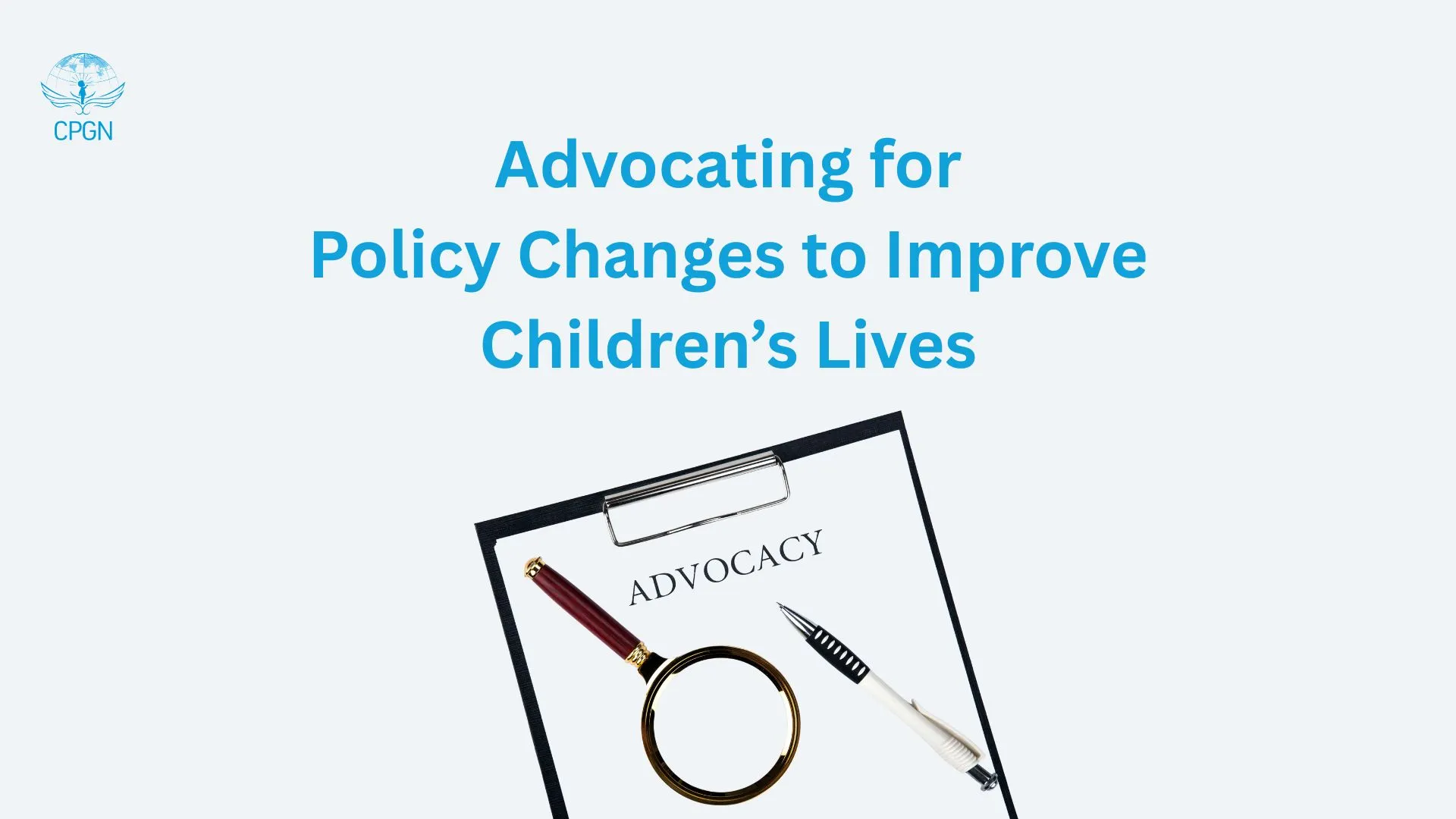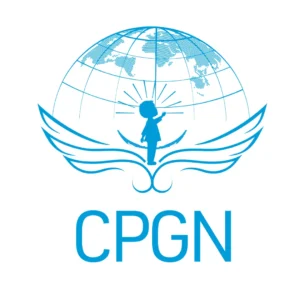Advocating for Policy Changes to Improve Children’s Lives
What if the right policy could change a child’s entire future?

Imagine a world where every child has a safe school, accessible healthcare, and freedom from abuse. Policies turn that vision into reality. When laws and systems center children’s best interests, families grow stronger, and communities become safer.
At the Child Protection Global Network (CPGN), advocacy isn’t optional—it’s urgent. Strong, evidence-based child protection policy saves lives, heals families, and opens doors for children who might otherwise be left behind.
Why Policy Change Matters for Children’s Welfare
Policy is not just paperwork, it’s protection. Clear standards for reporting abuse, safe schools, healthcare access, and economic support reduce risk and improve outcomes over a lifetime. Evidence shows that violence against children harms health, learning, and future earnings, while effective prevention policies reduce both human suffering and social costs (UNICEF, Violence Against Children).
Poverty magnifies risk. When families face food insecurity, unstable housing, or job loss, stress rises and support systems fray. Conversely, when governments invest in prevention, social protection, trauma-informed services, and a strong child protection policy, children experience fewer incidents of harm, better mental health, and higher school completion rates.
The Role of CPGN in Advocacy
For two decades, CPGN has worked across all 50 U.S. states and with global partners to protect children, empower families, and influence policy. We bridge local realities with decision-making spaces by pairing data with lived experience. Our advocacy elevates what families and survivors tell us, then translates those insights into practical reforms.
CPGN’s work spans prevention education, legal advocacy, training, and emergency response. We collaborate with educators, health professionals, and policymakers to close gaps, strengthen enforcement, and fund the supports families need to thrive.
Key Policy Areas That Shape Children’s Futures
Education
Education is more than learning—it’s a shield. Policies that guarantee safe, inclusive, quality education keep children in classrooms and out of harm. Clear anti-violence protocols, teacher training, and school-based counseling protect students and build trust.
Helpful resource: CPGN’s guide on teaching body safety in age-appropriate ways
Healthcare
Healthcare is a lifeline. Equitable access to pediatric care, mental-health services, and trauma-informed treatment helps children recover and reduces long-term harm. Family-friendly policies—like paid leave, affordable insurance, and integrated behavioral health—ensure help arrives early, before challenges escalate.
Child Protection Laws
Laws help keep children safe. They stop child marriage, fight online abuse, and require adults to report harm. This shows the importance of child safety laws. But laws alone are not enough. Workers need training, money, and clear responsibility so they can act fast. Safe technology can also help report abuse and respond quickly while protecting children’s privacy.
Poverty Reduction
Economic stability protects children. Income supports, childcare access, living-wage policies, and affordable housing reduce neglect risk and household stress. When families have the resources to meet basic needs, children are safer and better able to learn, grow, and dream.
How Policy Advocacy Creates Real Impact
1) Research & Data Collection
We start by listening—to families, survivors, educators, and health workers—and pairing their insights with credible data. Evidence-based frameworks guide what to prioritize and how to measure progress (WHO/UNICEF INSPIRE strategies).
2) Building Coalitions
We unite NGOs, schools, health agencies, survivor-led groups, and community leaders. Coalitions amplify reach and credibility, align messages, and turn individual efforts into a shared movement.
3) Engaging Policymakers
We present practical, fundable solutions grounded in research and lived experience. We offer draft language, implementation plans, and training pathways so reforms are realistic and sustainable.
4) Empowering Community Voices
Stories change minds. When survivors and families speak, data gains depth and urgency. We provide safe channels to share experiences, protect confidentiality, and bring community priorities into policy rooms.
Global signals of progress include countries that strengthened child-safeguarding laws, restricted corporal punishment, and expanded social protection—often seeing cultural shifts, better reporting, and improved school retention. The throughline is clear: when prevention, response, and recovery work together, children do better.
Challenges in Policy Reform
Advocacy is powerful, but obstacles are real: political resistance, budget constraints, uneven enforcement, and public misconceptions. Systems change can be slow and nonlinear. Yet persistence pays off. Transparent monitoring, public education, and cross-sector partnerships keep momentum strong and hold institutions accountable.
CPGN addresses barriers with training, coalition-building, survivor leadership, and sustained legislative engagement. We keep doors open—because children’s lives are at stake.
CPGN’s Approach: From Prevention to Recovery

Prevention: We deliver workshops, body-safety lessons, and outreach campaigns so parents, teachers, and children can spot risks early and act confidently.
Intervention: We support confidential reporting, rapid referrals, and coordinated crisis response so harm is identified and addressed swiftly.
Support & Recovery: We connect survivors to legal help, therapy, and long-term empowerment programs that restore dignity and hope.
This end-to-end model ensures no child slips through the cracks—and no family faces recovery alone.
Empowering Communities Through Advocacy
Policy starts with people. CPGN equips parents, teachers, and local leaders to recognize warning signs, document concerns, and use trusted reporting channels. We also help communities build protective networks that reduce isolation and strengthen resilience.Practical family strategies like building social support, learning child development, and accessing concrete help in tough times—are proven protective factors.
Actionable takeaways you can use today:
- Learn definitions and indicators of abuse and neglect, and follow local reporting laws.
- Teach body safety and consent early; repeat often in age-appropriate ways.
- Connect families with mental-health and social-service supports before crises escalate.
- Participate in school and neighborhood coalitions to advocate for safety and inclusion.
- Track what works locally and share results—data moves policy.
Take Action: Join CPGN’s Mission
What if you could help rewrite a child’s future? You can.
- Join: Volunteer with CPGN to support awareness and advocacy efforts.
- Donate: Sustain programs that protect, heal, and empower.
- Share: Circulate our guides so more families know their options—and their rights.
Together, we can protect children, influence policy, and build safer futures—not just for today, but for generations to come.
Mark Schwartz
See a child in danger? If you are in immediate danger, call local emergency services. For guidance from CPGN, Get Help.
CPGN is a 501(c)(3) — donations are tax-deductible where applicable. Our goal is to ensure the safety and protection of every child until it is achieved.
Quick Links
See a child in danger? If you are in immediate danger, call local emergency services. For guidance from CPGN, Get Help.
CPGN is a 501(c)(3) — donations are tax-deductible where applicable. Our goal is to ensure the safety and protection of every child until it is achieved.
Copyright © 2026 CPGN. All rights reserved by Majnate LLP | Privacy Policy | Terms and Conditions

